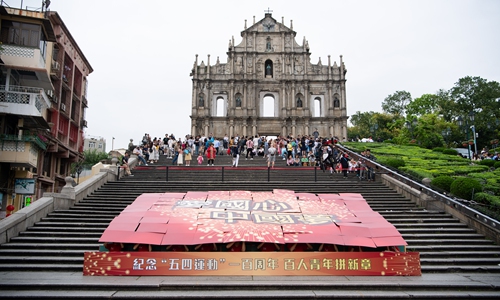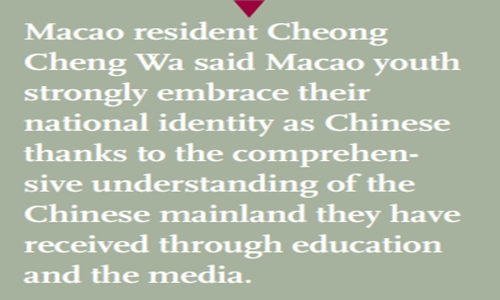HOME >> CHINA
More young people in Macao hope to study and work in the Chinese mainland
By Li Qiao Source:Global Times Published: 2019/11/14 21:54:18

A hundred Macao youngsters form a banner to mark the 100th anniversary of the May Fourth Movement in front of the Ruins of St. Paul's in Macao on May 4. Photo: IC
○ Macao youth embrace a strong sense of national identity and are willing to study on the Chinese mainland
○ The rapid development of the Guangdong-Hong Kong-Macao Greater Bay Area under national support gives confidence to Macao youth for work and living with prosperity
Many young people in Macao hold a strong sense of national identity which inspires them to embrace various opportunities on the Chinese mainland, especially in the Guangdong-Hong Kong-Macao Greater Bay Area (GBA).
On November 7, the central government introduced 15 policies and measures to benefit Macao after the bay area construction leading group meeting, according to the office of the Chief Executive of Macao Special Administrative Region.
It said that these policies and measures are being implemented to accelerate the construction of the GBA; further facilitate Macao citizens' entry into employment and education opportunities in the area; strengthen talent, logistics and capital flow within the area; and support the development of professional sectors in the area.
Cheong Cheng Wa, 28, a member of Macao New Chinese Youth Association in his fourth year of a PhD in Peking University, told the Global Times: "After graduation, I would like to pursue career opportunities on the Chinese mainland, especially the Greater Bay Area, to challenge myself to develop further, and also to make contributions to my motherland."
National identity
The life of people in Macao has improved dramatically, especially when it comes to family income and public safety, since Macao's return to the motherland in 1999. Cheong and his friends often sigh with emotion: "How good it would be if Macao could have returned to the motherland earlier!"
The colonial rule of Portugal was relatively incompetent, which led to poor social safety. "When I was in elementary school, my parents always warned me repeatedly to go home as early as possible, as they were worried about my safety," Cheong said.
In 2019, Journal Cheng Pou, a local newspaper, reported that Macao was ranked the safest city in China.
Cheong said Macao youth strongly embrace their national identity as Chinese thanks to the comprehensive understanding of the Chinese mainland they have received through education and the media.
He said it is a pity that biased media coverage has misled Hong Kong youth. "Some biased Hong Kong and Western media exaggerate individual incidences of bad news happening in some provinces, claiming that the whole Chinese mainland is like that. And many Hong Kong people believe whatever these kinds of reports said as they are unfamiliar with the mainland," Cheong said.
Chen Shengbiao, 28, who worked as a Chinese teacher in a high school in Macao before coming to Tsinghua University for his PhD this August, told the Global Times that Macao students use the same history textbooks as the mainland, so they hold a more comprehensive understanding of the history of the Chinese mainland and Macao.
He is still impressed by the People's Liberation Army Macao Garrison helping Macao residents to tide over the severe Typhoon Hato in August 2017, which was the first time the garrison assisted the Macao Special Administrative Region government in disaster relief.
"My students also appreciated and even felt inspired by the garrison, as some of them went to help the soldiers clean the streets," Chen said. "They came back to school with a sense of gratitude for what the garrison in Macao had done and told me that their life could not have gotten back to normal so quickly without the hard work of the garrison over those three days and nights."
Macao residents voluntarily sent meals and water to the soldiers, but the soldiers refused to take anything from the people. According to a report from the Xinhua News Agency in November 2017, 150,000 Macao compatriots signed their names in an open letter thanking the PLA garrison for their assistance in disaster relief.
Deep communication
Cheong Cheng Wa is glad that he came to Beijing in 2013 to study for a master's degree. "The development of the mainland has been extremely fast in the last few years, so I grabbed a good opportunity at the right time."
Cheong's friends didn't understand his choice, as the employment rate in Macao was very high. They could get a suitable job even if they hadn't completed their bachelor's degree, and life in Macao seemed more comfortable.
"However, I broadened my horizons on the mainland and had various experiences which I would never had been able to have in Macao," Cheong said.
During his time at Peking University, Cheong attended the celebration of the 40th anniversary of China's reform and opening-up, the 19th National People's Congress, and the grand gathering to celebrate the 70th anniversary of the founding of the People's Republic of China as a representative of Macao's youth.
Cheong said he had never expected that he, as a young person, could be directly involved in China's decisions concerning its construction and development, which strengthened his feelings of national identity a great deal.
"My roommates in Peking University also helped me to be more open-minded," Cheong said. He lived with undergraduate students in Peking University, who are regarded as some of the top students in China.
"Even though I was a master's student at that time, those 'younger brothers' inspired me with their abundant knowledge, work ethic and strong competiveness," Cheong said, adding that, "I enjoyed discussing domestic and international history, culture and economics with them. I was always surprised that how they could know so much!"
Many students from Macao prefer to live with other Macao students, assuming the convenience of close proximity to others with a shared dialect, culture, and lifestyle. However, Cheong insists on persuading his Macao friends to live with students from the mainland to promote communication through various study experiences and learn from each other.
Chen told the Global Times that two thirds of the high school graduates in his class chose to go to universities on the mainland. His students want to know more about the mainland and not limit themselves to Macao.
According to the Higher Education Bureau of the Macao SAR government, in order to attract more outstanding high school graduates from Macao to the mainland for higher education, 95 mainland colleges and universities will provide 1,185 slots for Macao students in 2020. In principle, all majors will be open to students from Macao.
With the strong support of China's Ministry of Education, the mainland has adjusted the admission policy for students from Macao in recent years. In 2016, there were 580 slots, which were increased by 60 percent to 930 in 2017. The quota has since continued to rise steadily, and more and more universities on the mainland are enrolling students from Macao.
Chan himself quit his job and came to Tsinghua University to do research on Chinese national traditional sports this August. "I would like to devote myself to the transmission of Chinese traditional culture and heritage," he said.
Future of the bay area
Chen would like to pursue his career in the Greater Bay Area, as China will implement more and more beneficial and supportive policies of introducing talent for the rapid development of the area.
"Our colonial history has not erased traditional Chinese culture in Macao. The spirit of Mazu culture and the culture of regional communities runs in the blood of Macao's people," Chen asserted, adding that "that will be a good advantage for me to developing in the area."
Housing prices in Macao are also too high for many young people in Macao to afford. However, there are more options, such as buying real estate in other cities, where prices are lower, within the area under many preferential policies, Chan explained.
Cheong thinks that top cities on the mainland hold diversified industry and career opportunities at the global standard. He is planning to first seek job opportunities in Beijing after his graduation in 2020, and then go back to work in the bay area several years later once he has acquired more professional skills and increased his work experience.
They are both confident in their expectations of the area's future prosperity.
According to a survey regarding the sentiments of Macao youth conducted by the Macau University of Science and Technology released in May, Macao teenagers under the age of 18 have the highest degree of recognition of the development of Macao, reaching 80 percent.
With the development of the GBA, the mainland is attracting more young people from Macao. According to survey results between 2017 and 2019, young people in Macao are generally optimistic about the development prospects of Macao and the mainland.

Newspaper headline: Unity to prosperity
Posted in: IN-DEPTH,CHINA FOCUS